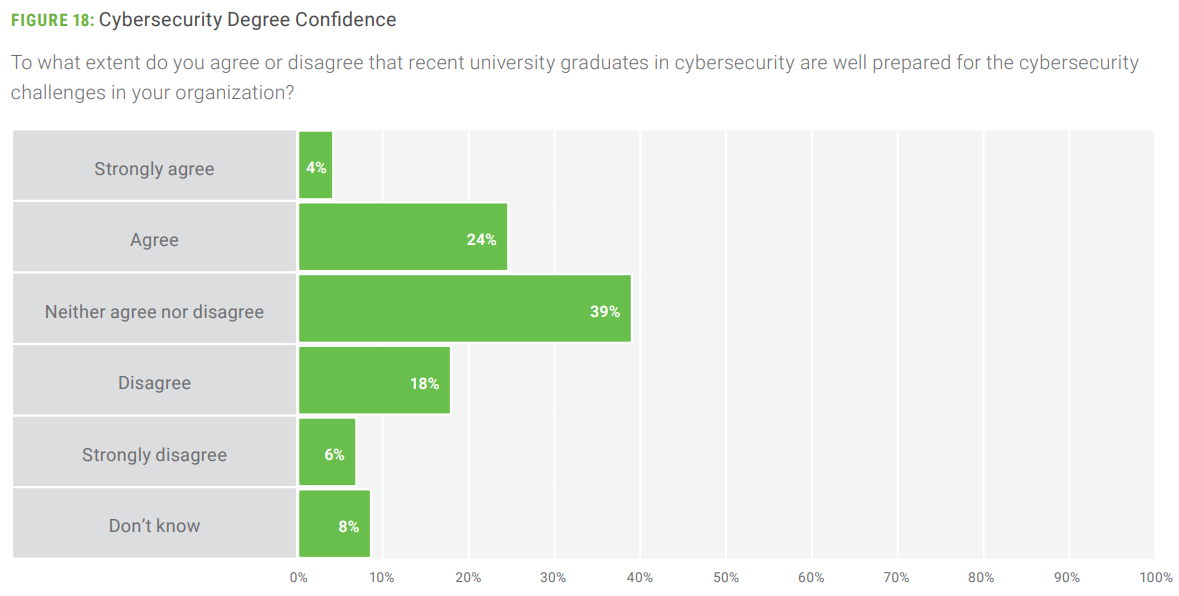The importance of IT certifications in boosting your career
If you want to get started or advance your career in information technology (IT) and cybersecurity, the outlook is good: Career opportunities are at or near an all-time high.
The Bureau of Labor Statistics anticipates approximately 377,500 job openings in IT annually, and CyberSeek found 572,392 openings requesting cybersecurity-related skills over the past year.
When it comes to filling those positions, hiring managers most often look for two things, according to the State of Cybersecurity 2023 report: hands-on experience and credentials.
- 95% of employers say hands-on experience is somewhat or very important when assessing a candidate
- 87% say IT and cybersecurity credentials are somewhat or very important
“Certs are good in that they give us a benchmark that everyone equally applies to,” says instructor Jason Dion. “[They tell] an employer that you cared enough to take it — that you were willing to put in the time to learn the material sitting in those books. You’re trainable.”

FREE role-guided training plans
That certification benchmark combined with hands-on experience — whether from school projects, a home lab, volunteer work or platforms that offer hands-on labs — is an easy way to signify that you may be fit for the job — and that you’ll likely be able to do the required job duties.
Debunking myths about IT certifications
One pervasive myth in the tech world is that a traditional university degree is the only career path in the IT landscape. Only 28% of employers agreed that university cybersecurity graduates are well prepared for the cybersecurity challenges in an organization.

Source: State of Cybersecurity 2023 report
“The percentage of organizations requiring a degree to fill entry-level cybersecurity positions remains consistent at 52%; however, the persistent shortfalls in technical and soft skills competencies noted among recent university graduates challenge the effectiveness of cybersecurity degree programs to meet the needs of employers,” the report stated.
Some employers are widening their pools by lessening their requirements in recent years. This includes large companies like IBM, Googe, Accenture and Okta.
Getting a degree has a definite value, but IT certifications allow you to drill down and focus on more specialized skills. You can use certifications to tailor your abilities to the evolving industry demands. This is why more managers than ever see certifications as equally valid educational currency to traditional college degrees. Many employers even prefer them, viewing certifications as evidence that a candidate is dedicated to staying current with technological advancements.
Key IT certification benefits
IT and cybersecurity entry-level certifications offer a range of professional benefits. They validate that your knowledge and skills are up-to-date, help you build targeted skills for your career path, and can help you network and gain recognition within the community. They can also lead to promotions, new career opportunities and higher salaries.
Skill enhancement
Certifications often build more targeted skillsets as you advance in your career. Take CompTIA’s career pathway as just one example. They have “core certifications” to help build your help desk (A+), networking (Network+) and security (Security+) skills, after which you can branch into more specific pathways:
- Infrastructure, which includes Server+ Linux+ and Cloud+
- Cybersecurity, which includes Cybersecurity Analyst (CySA+), PenTest+ and CASP+
- Data and analytics, which includes Data+
Earning certifications through accredited organizations is a wonderful way to stay up-to-date and enhance your skills.
Career advancement
Certifications can be great for both skill development and your career, but it’s also important to have a career plan and not chase after every popular certification available. You can think of certifications in terms of both career planning and technology focus.
There are hundreds of job titles, but we worked with our clients at Infosec to hone in on the twelve most popular roles. These range from SOC Analyst and Secure Coder to Cloud Security Engineer and Privacy Manager.
When you think of how certifications can help you reach your goals, there are vendor-neutral certifications, like those from CompTIA and ISACA, and vendor-specific certifications, like those from Microsoft and Cisco. For example, if you want to learn general networking skills, the CompTIA Network+ is an excellent option, but if you know the role you’re pursuing uses Cisco technology, you may want to consider earning the Cisco Certified Network Associate (CCNA) instead.
Salary boost
Thirty percent of cybersecurity learners at Infosec reported a meaningful change in employment, whether that was a new job, a promotion or a team or role change, according to the 2023 Outcomes Report.
Regarding employers, the latest IT & Skills Salary report tried to quantify the added value a certified employee brings to an organization. Forty-five percent of respondents said $20,000 or more, and 75% said $10,000 or more. Both individuals and employers are seeing the financial benefits of certified employees.
Professional credibility
Certifications also provide professional credibility. It’s an easy way to show your peers that you’ve put in the effort and are committed to the field. Many certification organizations also have local and national chapters and meetups where you can network with your peers and earn the continuing education credits necessary to maintain most certifications.
Meeting job requirements
Some jobs either require or request employees to have certain certifications. Take the Security+ certification. Of the approximately 570,000 U.S. job openings tracked on the CyberSeek website, one in seven requests candidates have their Security+. It’s more than just a request for those in the DoD space. Having a Security+ or another certification is a job requirement for some roles.
Popular IT certifications and their impact
You might already have your sights set on your desired career path and the IT certifications that help support that path. If you haven’t, here are some common options to consider.
From help desk to cybersecurity specialist
A cybersecurity specialist is a broad role that can contain a variety of job titles. If you want to build a solid foundation of skills leading up to a career in cybersecurity, you can follow the hundreds of thousands of professionals who went before you using the CompTIA career path. As mentioned above, this covers three “core” certifications designed to build your skills over several years and job titles:
- CompTIA A+: Aligns with nine to 12 months of support experience and job titles such as help desk technician, IT specialist and IT support manager
- CompTIA Network+: Aligns with nine to 12 months of networking experience and job titles such as network security operations, network security analyst and data architect
- CompTIA Security+: Aligns with two years of experience in IT with a security focus and job titles such as security administration, systems administrator and security analyst
Systems administrator and cloud administrator
A systems administrator helps manage the configuration and operation of various IT systems, servers and networks. As more systems have moved to the cloud, some job roles specialize in cloud admin and security, and some have a mix. Common certifications for these types of roles include:
- Red Hat Certified System Administrator (RHCSA): Validates your skills in managing and operating Red Hat Enterprise Linux (RHEL) systems, a leading enterprise Linux distribution
- Linux+: Validates your knowledge of managing and troubleshooting Linux-based systems
- Cloud+: Validates your knowledge of managing, securing and maintaining cloud-based systems
- AWS Certified Solutions Architect – Associate: Validates your expertise in designing, deploying and managing distributed systems on Amazon Web Services
- Microsoft Certified: Azure Administrator: Validates your expertise in services, workloads, security and privacy for Microsoft Azure
Web and application developer
A web application developer or application developer helps create and develop the applications individuals and organizations use every day. They require knowledge of programming languages like HTML, Python, Ruby and JavaScript. They also help troubleshoot applications by testing for performance and security. Some certifications and skills to help in these roles include:
- CSSLP: The Certified Secure Software Lifecycle Professional validates your knowledge of implementing secure code throughout the development process
- OWASP Top Ten: Although not an official certification, understanding the 10 most common and impactful web application security issues is essential for those working in developer roles
- Secure coding training: As you develop skills in PHP, Java, .NET and other languages, ensuring that code is secure is an essential skill to develop as well
Are IT certifications worth it?
IT and cybersecurity certifications can be a great investment for your career. There are many ways to train for your certification, ranging from books at your library and free online resources to live boot camps with an expert instructor. No matter how you train, there is a cost to take the exam. Depending on the certification exam, this can range from a few hundred dollars to more than $1,000.

Get your guide to the top-paying certifications
With more than 448,000 U.S. cybersecurity job openings annually, get answers to all your cybersecurity salary questions with our free ebook!
Live boot camps, like those provided by Infosec, usually cost $1,500 to $4,000 and include everything you need: prep materials, days of live instruction, hands-on exercises, materials to continue learning after your live boot camp and the exam voucher. Most Infosec boot camps also come with additional support like an Exam Pass Guarantee, which means if you fail your first attempt, you’ll get a second exam voucher at no cost.
It’s always a good idea to check with your current employer to see if they offer any programs or financial support to help you get certified. If not, it’s up to you to determine if the investment in your career is worth it.
Should I get an IT certification?
Although certifications are great, they may not be the right choice if you’re unsure of your career direction. Alternatively, you may want to explore a platform like Infosec Skills. This will allow you to take courses and labs related to various roles. You can explore at your own pace, find what you like (and don’t like), and then commit to a specific certification once you’re more confident in your career direction.
For more information, browse Infosec certification boot camps and the Infosec Skills course library.





